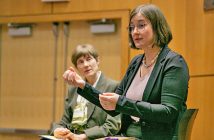 |
| Philip Kitcher Photo by Dan Creighton |
On April 9, humanist and atheist Philip Kitcher, Ph.D., told a audience at Fordham’s Lincoln Center campus that even though he believes much of what the world’s religions have to say is untrue, they still have a great deal to offer.
Kitcher, the John Dewey professor of philosophy at Columbia University, delivered “Science, Religion and Progress,” to a standing-room-only crowd at the Lowenstein Center.
In his wide-ranging talk, Kitcher delved into the fields of mathematics, ethics, and science and cited Sir William Hamilton, Robert Bellah, and Ludwig Wittgenstein, among others, on the way to articulating his own pragmatist understanding of truth, which recognizes multiple kinds of truth
Among the different kinds of “truths” that exist, he said, is scientific truth, or factual truth. There are other kinds of truths, however, expressed in the ways in which we construct and reconstruct the worlds we live in. When people first realized in the 19th century, for instance, that not all of the things that live in the sea are fish, and that whales, seals, and dolphins are different and separate (from fish), it represented a reconstruction. And this process continues to this day:
“Some of the differences that are going on at the moment, as we re-conceptualize the ways we think about people’s sexuality or about the differences within the human population, are restructurings of the world,” he said.
Because there are different kinds of truth, he said, it is possible to endorse seemingly incompatible truths of different kinds without contradiction:
“There can be statements that, interpreted in one way, specifically as candidates for scientific truth, are inconsistent with one another. But when they’re interpreted in a different way, specifically as parts of myth, and as Bellah says, ‘true myths,’ its possible without contradiction to affirm both of them,” he said.
“My thesis is that the way in which truth works varies across different kinds of linguistic contexts and things that we do with language,” he said.
When it comes to religions, Kitcher stated that although he thinks that the stories of all the major religions are false in the literal, factual, scientific sense, they can be true in another sense. That’s because the “strong mythical truths” they tell reflect enduring features of the human condition, and they will always remain valuable.
“Truth applies within the context of religion when religions introduce new linguistic forms and new statements that form stable elements of progressive religious practice,” he said. “As with the pragmatist insight into truth in mathematics and ethics, it is one that allows for the idea that a notion of truth is emerging from a prior notion of progress, and that notion of progress is founded in human needs.”
Kitcher disagrees with many of his fellow secular humanists, however, who believe that danger can result from religions that claim that their claims are literally true.
“Believing something that is false is not the worst thing that can happen to someone.”
“People who are bereft of some sort of religious practices can sometimes suffer far more greatly than any gains they might have by coming to believe true things,” he said.
“I mean, we have to get real here. If we’re talking about real people in the real world, people who are suffering, then these people gain enormously from religious practices.”
Kitcher’s talk was part of the annual John C. and Jeanette D. Walton Lecture in Science, Philosophy and Religion which aims at fostering an exchange of ideas at the intersection of science, philosophy, and theology with an eye to promoting understanding and intellectual enrichment across a range of disciplines.
 |
| Philip Kitcher Photo by Dan Creighton |


